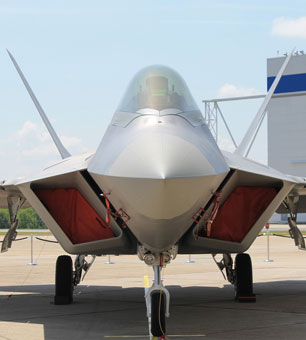You know it’s a big moment for defenders of the United States’ bloated military budget when some of the all-time superstars of the Military-Industrial-Congressional Complex descend on Capitol Hill to fight for their perceived right to profit.
The U.S. House of Representatives is scheduled to address the 2013 Defense Appropriations bill beginning Wednesday, which will go a long way in framing the later debate on automatic cuts to defense set to happen on January 2, 2013. The “sequester” was set into law — via the Budget Control Act — last year in an effort to compel Congress to reach a deficit-reduction plan. The automatic cuts would take the Pentagon’s requested FY 2013 budget of $526 billion to $469 billion, reducing Department of Defense spending by around $1 trillion over the next decade. The Congressional Budget Office says that amount is “larger than it was in 2006 (in 2013 dollars) and larger than the average base budget during the 1980s.” If you recall, 2006 wasn’t such a bad year to be a defense contractor.
Ahead of that floor debate, House Armed Services Committee Chairman Howard “Buck” McKeon (R-Calif.) — the top benefactor of defense-industry contributions in Washington as Brave New Foundation’s War Costs campaign has pointed out before — will allow the likes of Lockheed Martin CEO Robert Stevens yet another platform — after weeks crying foul over potential jobs cuts a reduced defense budget would mean — to inject further panic and hype in front of a committee hearing Wednesday morning on Capitol Hill.
Stevens has called the planned cuts “blunt force trauma” to the defense industry’s economic well-being. Lockheed has also threatened to send layoff notices to employees ahead of Election Day, a craven attempt to scare workers and members of Congress with industry jobs in their districts. This is not to mention the$25.4 million Stevens made in 2011, the second consecutive year of record revenue and profit for the defense industry. Maybe Stevens could find money for his employees by cutting lobby expenditures? Lockheed spent $15 million on lobbying in 2011, up 19 percent from 2010. Lobbying by all defense contractors went up 11.5 percent in the first quarter of 2012, to $15.9 million. The idea that the likes of Lockheed Martin taking a cataclysmic tumble following the needed cuts to defense is about as unbelievable as how much taxpayer money that went to defense contractors in 2011, $373 billion, the second-highest yearly total ever. Here, Stevens and his ilk are at it again, pushing for more profits at the risk of further death and destruction, as War Costs has examined in the past.
By the way, this is an industry that, from 2008 to 2010, paid an average annual tax rate of 17.5 percent, making it among the least-taxed sectors in the country. Boeing itself paid a rate of -1.8 percent, according to the Citizens for Tax Justice.
On Tuesday, the Aerospace Industries Association unveiled an update to their 2011 study on the economic impact of such cuts. True to an industry attempting to protect their bottom line, the studies predict excessive job loss next year, around 1.09 million, if the cuts occur. Economists and academics have had a field day debunking this study, partly because, according to the Political Economy Research Institute at the University of Massachusetts-Amherst, defense spending creates fewer jobs compared to other forms of government spending — on sectors like health care and education — and even some tax cuts. (See more on these numbers atWarCosts.com.)
Industry shilling is only part of the onslaught. Also on Tuesday, former Vice President Dick Cheney — a scion of wasteful defense spending, profiteering and all that is the revolving door between government and industry in Washington — was on Capitol Hill rallying Republicans to the cause. According to Politico, Senate Republicans described the meeting with Cheney as short on policy replacements for cuts and big on stressing the investments in place amid the defense industry. What a surprise.
The defense industry has seen record profits this past decade marked by consistent warfare and little accountability, as a final report on the amount lost during the $51.4 billion Iraq war reconstruction program concludes. Enough of the propaganda. More defense money does not make the United States safer, as we’ve been told, and cutting a fraction of that money does not mean “doomsday” for the country as Secretary of Defense Leon Panetta has claimed. It’s simply common sense that folks across the political spectrum agree on, even those in areas heavy on defense manufacturing, according to a new comprehensive study.
Tell your members of Congress to support amendments in the bill that aim to reduce the defense budget, halt the war in Afghanistan and remove troops permanently stationed in Europe.
It’s time elected officials hear our voice. Stop the spending that bankrupts us at home and encourages violence and war abroad.
Visit Brave New Foundation’s WarCosts.com for more as the defense industry’s cynical efforts unfold in the coming months.
Join us in defending the truth before it’s too late
The future of independent journalism is uncertain, and the consequences of losing it are too grave to ignore. To ensure Truthout remains safe, strong, and free, we need to raise $46,000 in the next 7 days. Every dollar raised goes directly toward the costs of producing news you can trust.
Please give what you can — because by supporting us with a tax-deductible donation, you’re not just preserving a source of news, you’re helping to safeguard what’s left of our democracy.
